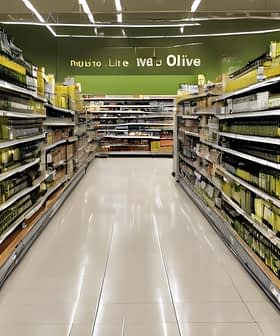2014 WILL BE KNOWN by Italian olive oil producers as the ‘black year’ — a particularly bad one for a number of reasons — among them the fact that the weather has been great if you’re an olive fruit fly, and a bacterial blight that seemed to come from nowhere has led to the destruction of hundreds of thousands of trees in Apulia. Not to mention Spain will produce nearly one million tons less than it did last year.
Read the label well, especially the small print
World olive oil production is expected to tumble by 27 percent, putting an entire agricultural sector in distress.
Meanwhile, as usual, prices for Italian olive oil are commanding a healthy premium, rising by 50 percent in just the last month to nearly €6 per liter.
All of this is also contributing to a tough situation for olive oil consumers as retail prices climb and the climate, as unfriendly as it has been for olives, is just right for olive oil fraud.
The Italian agricultural association Coldiretti has raised the alarm about an “invasion of foreign olive oils,” based on Istat data for the first seven months of 2014. “If the trend is maintained,” said the president of the association, Roberto Moncalvo, “the arrival in Italy of foreign olive oil will reach a historic high in 2014,” and so will the pressures to commit olive oil fraud. A whopping two out of three bottles filled in Italy will contain foreign olive oil. “Read the label well, especially the small print,” he advised.
Just in time, consumers are reminded that, from December 13, new laws on EU labeling laws will come into effect which mandate more transparent label information.
The recently-amended EU marketing standards for olive oil (regulation 29/ 2012) require the following:
- Information that has to appear on olive oil packaging must be in the main field of vision in a uniform body of text. The EU hopes this will stop a misleading practice sometimes seen whereby some information, such as about the quality of the oil, or the country of origin appears in a smaller font;
- The back label of olive oil bottles must indicate that they should be stored in a cool, dark place. This aims at helping consumers maintain the quality of their oil longer;
- The harvest year may only be stated on the label if all the olive oil is from that harvest. This is said to be to enable consumers to ensure product freshness;
- EU member states must strengthen compliance checks – based on risk analysis – as well as sanctions, and send more detailed annual reports to the Commission on these checks and the outcomes.
The olive oil industry has welcomed the news: “No doubt the obligation to make the indication of origin on the front of the bottles of extra virgin olive oil, which was previously only expected on the back of the label, is a step forward for full transparency and proper information for the consumer,” said Assitol Federolio.
The clearer labeling is seen as a step in the right direction for consumers and a way to add value in this black moment for producers.
Meanwhile, enforcement efforts are being beefed up to combat the expected surge in falsely labeled olive oils, including those claiming to be made in Italy and substandard oils labeled extra virgin.








